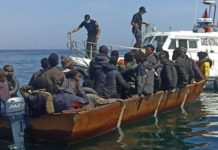by Vanessa Tomassini –
The High Council of State, also known as the Supreme Libyan Council of State, is a legislative assembly comparable to the Italian Senate; constituted under the Libyan Political Agreement signed in Skhirat in Morocco on December 17, 2015. Its formation was wanted by United Nations to try to end the clashes between the main factions in the Country, so it can advise both the Government of the National Accord and the House of Representatives and may express, under certain circumstances, a binding opinion on these institutions. As we have largely documented Libya is, besides the immigration issue, a daily crime scene. To try to make a point of the situation, we reached the President of the High Council of State, Abdurrahman Sewehli.
-Libya has recently been upset by war crimes (al-Abyar, Derna and Wearshefana), how are investigations going on? Have been identified any suspect?
“Sadly, in the absence of a true Government of national unity, that has the will and means to conduct such an investigation, a credible action in this crucial area will continue to be a challenging task at best”.
– You reproached the Libyan ambassador to the United Nations for not talking about the massacres. Do you think the Libyan tribunals are able to investigate independently?
“It is obvious that the Libyan judicial system need strengthening for it to carry out its duties in an effective, fair, and transparent manner nation-wide. As far as war crimes and crimes against humanity are concerned, we need help from the Security Council and the ICC to prevent the rise of an environment of impunity”.
– Wearshefana has recently been attacked by al-Juwaily forces. How the High Council of State sees this operation?
“While the great majority of the people in Wearshefana are law-abiding citizens, it is also a fact that it serves as refuge for criminal gangs. For years now, these gangs have subjected travellers on the main coastal road linking Tripoli with cities, towns, and Tunisia to the west of the capital to theft at gunpoint, carjacking, kidnapping for ransom, and murder on daily basis. People are demanding an end to this lawlessness. However, this is the responsibility of none other than legitimate state institutions and in a manner completely consistent with respect for human rights, the laws of armed conflict, and the protection of civilians”.
– General Khalifa Haftar is considered responsible for the attack on the deputy interior Minister of Tripoli. What do you think?
“More than anything Haftar’s attack on the Deputy Minister of the GNA, is a sign of weakness and should serve as a wake-up call to those parties that are, unwisely, try to build up Haftar as an indispensable party to bringing peace to Libya. Interestingly, we have not heard a whisper from these countries, which proclaim to support the GNA, regarding this and other similar incidents”.
– Haftar is also accused of many war crimes and the ICC has requested the delivery of commander al-Werfali. Why Tobruk still don’t deliver Werfali to the International Criminal Court?
“In response to the ICC warrant, Haftar’s army said on 18 August, “Werfalli, is under investigation… and is now under arrest”. However, the ICC prosecutor stated on November 9th that her office “received reports indicating that Mr al-Werfalli is at large…, and may have been involved in further killings”. She urged Haftar to ensure “Mr al-Werfalli’s immediate transfer to the Libyan authorities so that he may be surrendered to the Court without delay.” The question remains whether Haftar, being Werfalli’s commander, would risk handing him over to the ICC knowing that he himself maybe subject to prosecution under the doctrine of command responsibility in the ICC and under the US War Crimes Act as a US citizen”.
 – The House of Representatives opened the political process to former members of Gaddafi regime. What is the position of High Council of State about them? What do you think about a return in policy of Saif al- Islam Gaddafi?
– The House of Representatives opened the political process to former members of Gaddafi regime. What is the position of High Council of State about them? What do you think about a return in policy of Saif al- Islam Gaddafi?
“I suppose you’re referring to Law No. 6 regarding general amnesty passed by the House of Representative in 2015. This law is subject to review under the Libyan Political Agreement’s Article (62) or cancellation under Article (14) of the Additional Provisions of the agreement. Libyans welcome all who wish to join and participate in building a free and democratic Libya. Many from the old regime have in fact joined in and are now holding ministerial positions and top military posts. However, Saif al-Islam and others who wish to take Libya back to dictatorship and personality cult need to be told that they are not welcome. They also have to deal with ICC arrest warrants as well as Libyan judicial proceedings”.
– In addition to war crimes, there have been many deaths of migrants seeking to reach Italian coasts. What are you doing to stop these massacres? How do you evaluate Italian government’s policy?
“War crimes, abuse and death of migrants, and other problems are essentially the result of lack of a political solution and thereby lack of rule of law and governance. What is needed, and what we are working on, is a just, effective and enforceable political agreement. However, reaching such an agreement requires a partnership between national parties within a Libyan owned political process. It also requires the international community to take an unambiguous position regarding spoilers whether they are individuals or nations. As for Italy, we believe that it has been a reliable and active participant in helping Libya achieve stability and bring some realism and balance to the international community’s view of the situation”.
– Do you want to add something?
“We have reached a critical crossroads in the search for a political solution. The conditions are ripe and the parties to the agreement are closer than ever to achieving consensus. We made some progress in the Tunisia talks and Mr. Salamé submitted a proposal, which the State Council responded to positively. Contributing to these promising developments is a proposal from a group of House of Representatives and High Council of State members, as well as another proposal regarding elections. The missing ingredient that will push the process over the finish line is international consensus on a clear and firm stance against national, regional, and international parties that are attempting to obstruct the process”.













